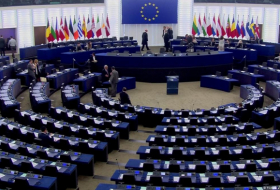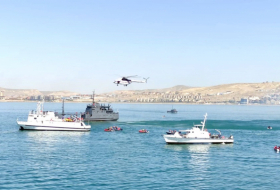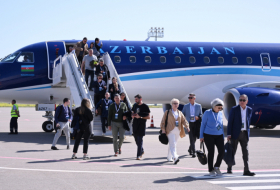Once a byword for innovation and progress, many people now view aviation as dirty and dangerous to the environment.
It contributes about 2% of the world's global emissions, and this is set to rise.
IATA, the airline trade body, predicts that passenger numbers will double to 8.2 billion a year by 2037. Planemaker Boeing forecasts there will be demand for 42,700-plus new aircraft over the next 20 years. Airbus predicts much the same.
Yet by 2050, the European Union wants the industry to reduce emissions of CO2 of 75%, of nitrogen oxides by 90%, and noise by 65%. And a new Carbon Offsetting and Reduction Scheme for International Aviation, agreed by 70 countries, comes into force in 2020.
So what is the industry doing to meet these formidable challenges?
Rolls-Royce, one of the world's major aero-engine makers, says its new-generation UltraFan, more than 10 years in development and scheduled to be ready for service in the middle of the next decade, will be 25% more fuel efficient than its first generation Trent engine.
Image copyrightHAVAHABERImage captionRolls-Royce says its UltraFan engine is 25% more fuel-efficient than some earlier engines
Airbus says that while all-electric aircraft are still some way off, due to battery weight and range issues, it is more hopeful about developing a hybrid-electric plane.
The manufacturer believes greener, quieter hybrid aircraft could be flying commercially by 2025. Airbus has joined Siemens and Rolls-Royce to develop the E-Fan X demonstrator aircraft, which is scheduled to fly next year.
Although the E-Fan X is a very important project, says Prof Iain Gray, director of aerospace at Cranfield University, the current state of battery tech means that the electrification of larger and long-haul aircraft is a long way off.
"Gas turbine engines will be here for decades. Most research [into electrification] is around very small aircraft," he warns.
Biofuels made from plant material or animal waste have often been touted as a sustainable alternative to kerosene-based jet fuels.
But given that a major airline might use more than four billion gallons of fuel a year, there is currently no biofuel plant in the world capable of producing even a fraction of what is needed, says Freya Burton, chief sustainability officer at Chicago-based LanzaTech, one of the leading players in the field of turning industrial waste into fuel.
"The SAF [Sustainable Aviation Fuel] sector is at a tipping point," she says. While using bio-products blended with fossil fuel is a proven concept, the necessary infrastructure and investment to scale up production is far from ready, she believes.
Last year, LanzaTech supplied biofuel to help power a test flight by Virgin Atlantic between Orlando, Florida, and London.
LanzaTech specialises in making ethanol via captured waste gases. But its biofuel for Virgin only accounted for 6% of the fuel mix.
Other companies are experimenting with food waste or algae, and several airlines are looking into the feasibility of using biofuels.
But there are a myriad of regulatory issues around the certification of biofuel for the safety-critical airline industry. Some biofuels in storage can degrade over time, and some have even affected rubber parts used in engines.
Another problem, says Ms Burton, is that biofuel is currently more expensive than fossil fuel - and will remain so until there are economies of scale.
IATA says the global airline industry's fuel bill was about $180bn (£138bn) in 2018, the biggest cost after labour. Given their wafer-thin margins, airlines have little incentive to buy more expensive fuel.
LanzaTech claims it could have three gas-to-ethanol plants ready in the UK by 2025 if it secured the necessary airline customers and government backing, producing about 125 million gallons of SAF a year.
Although the UK government is looking at the feasibility of a SAF plant, there is no sign of a decision any time soon.
Air traffic controls, too, are playing their part.
Contrary to popular belief, the number of aircraft caught in circling patterns over Britain's main airports is falling, says James Deeley, deputy head of environmental affairs at the UK's National Air Traffic Control (NATS).
Better air traffic management tech means that planes hundreds of miles from a destination airport now slow their cruising speed to avoid above-airport congestion. Similarly, aircraft are now better able to find the optimum height when crossing the Atlantic or make use of the jet stream to save fuel.
"It's all just so much more efficient," he says.
They can also fly more direct routes or fly closer together without compromising safety, says Mr Deeley.
"We've made some 400 changes in the last few years to improve the utilisation of airspace. They amount to a big difference."
This equates to about $175m in fuel savings over the last few years for aircraft using its airspace, he says.
Other incremental improvements involve changing the way air flows over wings to reduce drag, and using more cutting edge materials to make engines and airframes lighter.
But critics say none of this technological innovation is enough.
"Biofuels are not the clean fuel they're claimed to be, and risk taking land away from food production and destroying forests," says Mike Childs, head of science at environmental lobby group Friends of the Earth.
And electric planes are "little more than a pipe dream right now", he says. "And given the alarming rate of aviation expansion this sort of technology won't be readily available until it's far too late".
Prof Gray commends aviation's progress, but agrees that much more must be done.
"No other industry has spent so much money on improving its performance. But all the benefits that have been made are being offset by growth in air traffic."
The inescapable conclusion seems to be that, if we really want to reduce aviation's carbon emissions, we should all fly less often.
BBC
More about: aviation
















































